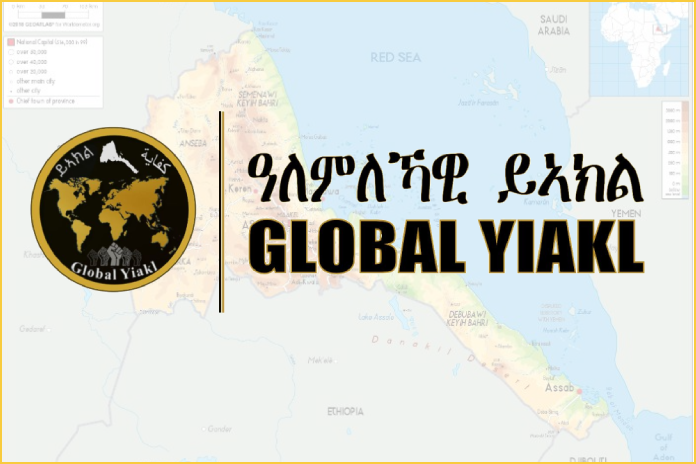About The Global Yiakl Eritrean Movement
Brief Background
The Global Yiakl (Enough) Eritrean Movement was launched in late 2018 following the so-called peace treaty of Eritrea with Ethiopia. Since then, the movement has gained support from Eritreans worldwide, including those inside the country. It is a grassroots public movement without affiliation with established opposition political parties or groups. The Movement is aimed at bringing about peace, justice and democracy in Eritrea by mobilising and uniting the Eritrean public at home and abroad to participate in national politics and to speak up for their rights and freedom. The movement is keen to work closely with other regional and international organisations and state and non-state actors to bring about the necessary change in Eritrea.

It has scored unprecedented success in stimulating tens of thousands of Eritreans, including the silent majority and some former supporters of the regime, to call for political change in Eritrea. Unlike the other Eritrean opposition groups/political parties working for political change in Eritrea, the Global Yiakl Eritrean Movement is widespread grassroots activism initiated by ordinary individuals passionate about political and social change in Eritrea. This widespread activism has spread as a virus and mobilised the public to drive political change in Eritrea from the bottom up.
The movement is active in advocacy and diplomacy, public awareness raising and education, exposing the regime for what it is in the face of the international community. De facto brings together all justice seekers to unite and work in unison, focusing on regime change to transition to a just and democratic system of governance.
The Movement has a clear political roadmap and strategy and is led by democratically elected global leadership. Global Yiakl Eritrean Movement is in 11 countries worldwide.
The current situation inside Eritrea – summary
Current realities in Eritrea could be described as the accumulation of years of oppression. Politics in Eritrea is conducted within a single-party totalitarian government led by a brutal dictator. There has been no sign of change or reform inside the country. Everything stays as before, and the country remains in a downward spiral.
However, things have further deteriorated inside the country after the outbreak of the war in Ethiopia and the regime’s involvement in supporting the Ethiopian government. Thousands of young conscripts have been deployed in this war, and thousands have either lost their lives or sustained lifelong injuries. The regime continues to beat its war drum, mobilising all its resources to this war effort. At the same time, domestic politics, economy and social misery are ignored mainly as if these are non-existent.
The regime’s human rights abuse continues unabated, with thousands of citizens incarcerated without trial. Torture and disappearance have become commonplace. Tens of thousands of political prisoners are languishing in more than 360 prison facilities in the country, whilst even more youth are fleeing the harsh realities of life in the country to wherever their feet and fate take them.
The Case of the arrested G15 and journalists
Following the start of the border war with Ethiopia in 1998, Eritrea found itself in a multifaceted crisis. The nation’s existence was at stake during Ethiopia’s third round of military aggression. The country has alienated itself from the rest of the world in the diplomatic arena for all practical purposes.
At the centre of this crisis, the government’s weaknesses and the ruling party, PFDJ (People’s Front for Democracy and Justice), were aggravated by the war with Ethiopia. Thus, fully aware of the inefficiencies of government machinery, recognising their responsibility and accountability and realising the consequences of not taking action, some 15 senior officials from the leadership publicly criticised the government and called for reforms.
Hence, what is commonly known as the G-15 is a reform group from within the ruling party, PFDJ, who publicly called on the government to be bound by the constitution ratified in 1997, the views and principles expressed by the G15 include the unconditional implementation of the body, the institutionalisation of government accountability and transparency, ensuring the rule of law, elimination of the unjust particular court system, liberalisation of the economy, the introduction of a multi-party-political system and respect for democratic rights and freedom.
These are issues that the Eritrean government still does not want to address despite a near-universal public demand. Indeed, these are the bones of contention dividing the reformers from the President and other inner circles of the PFDJ.
In the summer of 2001, the Eritrean people, who have in the past chosen not to speak out loud against government weaknesses and mismanagement as long as the danger from the enemy (Ethiopia) was present, then started to express their concern and speak out. The G15 was thus at the forefront of this and, as such, created the political impetus that has propelled and galvanised the ongoing struggle for democratised Eritrea that our Global Yiakl Eritrean Movement too is pushing for.
With those beliefs and values they upheld, the G15 have attracted tremendous support and appreciation from all sectors of society, including civil servants, the army, the police force, students, the elderly, academics and private press journalists.
The views of the G15 were expressed mainly using the then-private press and through interviews arranged with journalists. Their open letter calling for reform was published widely via the then-independent press.
Consequently, the arrest of the G15 on 18th September 2001 also led to the complete shutdown of the independent free press and the arrest of journalists working for them. Today, all members of the G15, journalists of the free press and anyone associated with them suspected of harbouring support for them have been locked up and kept incommunicado for more than 24 years.
Global Yiakl Eritrean Movement






